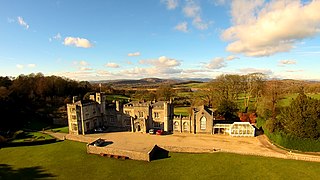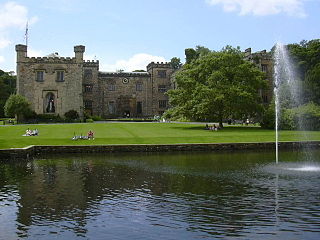See also
- Towneley family, many of whom were called Richard
| This disambiguation page lists articles about people with the same name. If an internal link led you here, you may wish to change the link to point directly to the intended article. |
Richard Townley (died 1711) was a privy counsellor.
Colonel Richard Townley was born in England probably at Astlam (Astleham) Manor in Littleton. He was the eighth son of Nicholas Townley of Littleton and Joanne White.
Richard Townley or Richard Towneley or Richard de Towneley may also refer to:
Richard de Towneley, also known as Richard de la Legh, was an English landowner and politician. He was an early member of the Towneley family of Towneley Hall in Burnley.
Richard Towneley was an English mathematician, natural philosopher and astronomer from Towneley near Burnley, Lancashire. He was the nephew of Christopher Towneley, who corresponded with a group of seventeenth-century astronomers in the north of England which included Jeremiah Horrocks, William Crabtree and William Gascoigne, the pioneer astronomers who laid the groundwork for research astronomy in the UK. An investigation carried out with the physician Henry Power, followed by correspondence with Robert Boyle, showed the relationship between the pressure and volume of gas in a closed system and led to the formulation of Boyle's Law, or as Boyle named it, Mr. Towneley's hypothesis. He introduced John Flamsteed to the micrometer and invented the deadbeat escapement used in two clocks in the Greenwich Observatory.
Richard Greaves Townley was an English Whig politician.
| This disambiguation page lists articles about people with the same name. If an internal link led you here, you may wish to change the link to point directly to the intended article. |

Charles Townley FRS was a wealthy English country gentleman, antiquary and collector. He travelled on three Grand Tours to Italy, buying antique sculpture, vases, coins, manuscripts and Old Master drawings and paintings. Many of the most important pieces from his collection, especially the Townley Marbles are now in the British Museum's Department of Greek and Roman Antiquities. The marbles were overshadowed at the time, and still today, by the Elgin Marbles.

Baron O'Hagan, of Tullahogue in the County of Tyrone, is a title in the Peerage of the United Kingdom. It was created on 14 June 1870 for Sir Thomas O'Hagan, then Lord Chancellor of Ireland. His younger son, the third Baron, served as a Lord-in-waiting from 1907 to 1910 in the Liberal administrations of Sir Henry Campbell-Bannerman and H. H. Asquith and was later a Deputy Speaker of the House of Lords. In 1909 Lord O'Hagan assumed by Royal licence the additional surname of Towneley, which was that of his maternal grandfather. As of 2010 the title is held by his grandson, the fourth Baron, who succeeded in 1961. He is the son of the Hon. Thomas Anthony Edward Towneley Strachey. Lord O'Hagan was a Member of the European Parliament for Devon from 1973 to 1975 and again from 1979 to 1994, first as an independent and later as a Conservative. He assumed in 1938 by deed poll the additional Christian name of Towneley and the surname of Strachey in lieu of his patronymic. Strachey was the surname of his maternal grandfather Edward Strachey, 1st Baron Strachie.

William Gascoigne was an English astronomer, mathematician and maker of scientific instruments from Middleton, Leeds who invented the micrometer. He was one of a group of astronomers in the north of England who followed the astronomy of Johannes Kepler which included, Jeremiah Horrocks and William Crabtree.

Towneley Park is owned and managed by Burnley Borough Council and is the largest and most popular park in Burnley, Lancashire, England. The main entrance to the park is within a mile of the town centre and the park extends to the south east, covering an area of some 180 hectares. At the southern end of the park is Towneley Hall, Burnley's art gallery and museum. To the north are golf courses and playing fields and to the south 24 acres of broadleaf woodland. On the southern boundary is a working farm called Towneley Farm with pastures and plantations extending eastwards into Cliviger.
Rev. James Townley was an English dramatist, the second son of Charles Townley, a merchant.
Sir Charles Townley was a long-serving officer of arms at the College of Arms in London.

Unity College is a mixed 11-16 comprehensive school in Burnley, Lancashire, England.

The High Sheriff of Lancashire is an ancient officer, now largely ceremonial, granted to Lancashire, a county in North West England. High Shrievalties are the oldest secular titles under the Crown, in England and Wales. The High Sheriff of Lancashire is the representative of the monarch in the county, and is the "Keeper of The Queen's Peace" in the county, executing judgements of the High Court through an Under Sheriff.
Henry Green was the pen name of Henry Vincent Yorke (1905–1973), an English novelist.

Leighton Hall is a historic house 0.5 miles (1 km) to the west of Yealand Conyers, Lancashire, England. It is recorded in the National Heritage List for England as a designated Grade II* listed building.

The Ribchester Helmet is a Roman bronze ceremonial helmet dating to between the late 1st and early 2nd centuries AD, which is now on display at the British Museum. It was found in Ribchester, Lancashire, England in 1796, as part of the Ribchester Hoard. The model of a sphinx that was believed to attach to the helmet was lost.

The Towneley or Townley family are an English family whose ancestry can be traced back to Norman England. Towneley Hall in Burnley, Lancashire, was the family seat until its sale, together with the surrounding park, to the corporation of Burnley in 1901. Towneley Hall is now a Grade I listed building and a large museum within Towneley Park.
John Towneley was an English Whig politician.

Cuerden Hall is a country mansion in the village of Cuerden near Preston, Lancashire, England. It is a Grade II* listed building. The Hall was formerly a family home between 1717 and 1906, and used by the Army until the 1960s. It is now a Sue Ryder Care Home. The parkland and wider estate are known as Cuerden Valley Park.
The High Sheriff of Louth was the Crown's representative for County Louth, a territory known as his bailiwick. Selected from three nominated people, he holds his office over the duration of a year. He has judicial, ceremonial and administrative functions and executes High Court Writs.

Francis Towneley, was an English Jacobite who was executed for his role in the rebellion of 1745.
Townley is a surname. Notable people with the surname include:

Robert Townley Parker (1793–1879) was a Unionist Member of Parliament for the United Kingdom House of Commons constituency of Preston.